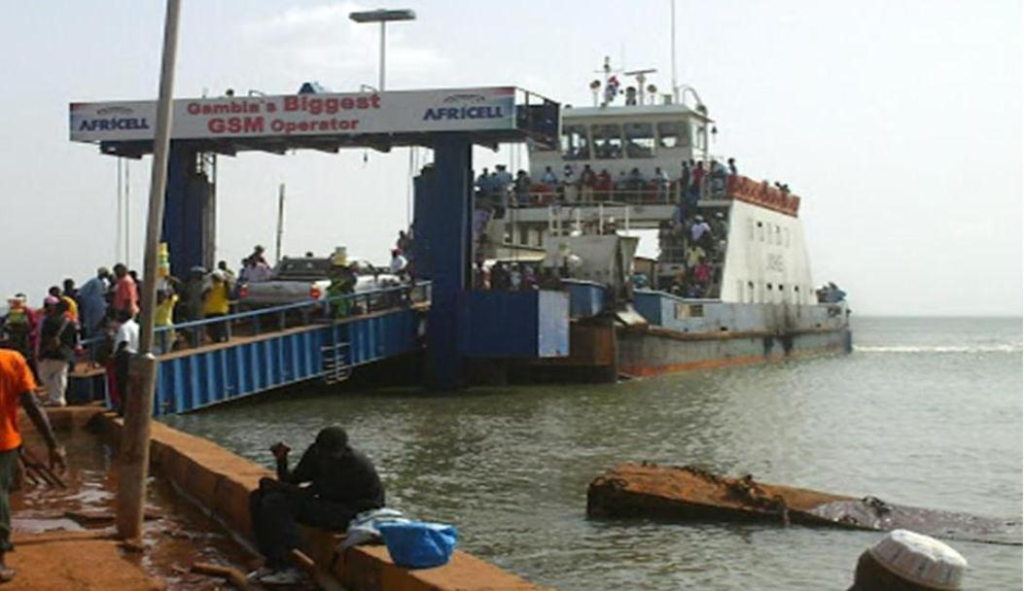
Lamin Jawara, the General Manager (GM) of the Gambia Ferry Services (GFS) has called for more support from the Gambia Ports Authority (GPA) and government, to provide stable and safe services to ferry users.
Jawara made this call in the wake of the recent incident which saw the Kanilai ferry stranded at sea, for nearly four hours, leaving many ferry users questioning the safety of the ferries (Kanilai).
While speaking to this medium about the incident last Thursday July 20th, Jawara said it happened because the captain had a miss-approach while trying to land vessel, and said the rear engines failed during re-approach of the lander.
“At the landing point, the captain attempted a first approach but missed and had to abort and re-approach for the second time, but during this process, the rear engine failed. Because of this, the ferry was forced to sit due to the winds and waves on the bank of the channel situated at the immediate vicinity of the ferry landing site and this is not wide enough, to accommodate the entire length of the ferry, but the breath of the vessel only,” he said. He explained “the ferry sat on the sand bank and the depth around that end at low tide is about 1.5 m while the draft of the ferry is 1.7 m.” That they later had an opportunity as the tide was rising but said the side engine was not operating and this made it difficult for the vessel to pull itself out. He said: “As a result, they had to wait for the Kunta-Kinteh Ferry that was on its way to Banjul to discharge passengers and return to Barra to rescue the passengers onboard the stranded ferry.”
According to him, the incident occurred between the hours of 4.30 pm to 7.30 pm. Further, narrating the causes of the unpleasant incident, the ferries general manager said the Kanilai ferry has three working engines: one at the rear and two in front.
“The ferry is designed with four engines but with time, the ferry is aging as well as the engines. These engines have been overhauled and as a result, many of them have almost reached their useful life. Therefore, they need replacement because these engines were installed in 2014. And since then, they have never been replaced by new ones. As we speak, the fleet of the ferry is old, and most of the vessels need replacement because the useful life of a ferry spans from twenty to thirty years. He lamented that even though the Kanilai ferry is almost eighteen years now, the rest of the fleet are all more than twenty years old.
“We wanted to replace the engine of the Kanilai ferry, but cannot find a supplier as it is out of production. We have contacted the engine manufacturer but there was no response from their end. We have also contacted a ship-builder, who neither responded, and the engine itself is out of production. What needs to be done now is to find a replacement engine which will require a lot of modification and re-engineering and this comes with cost,” he said.
Another challenge revealed by Jawara was the insufficient maintenance revenue available to the ferry services. He said 85% of their revenue goes to the payment of staff salaries. He said 85% on the payment of salaries was not the making of the ferry services management, but a general increment on salaries of the GPA which automatically affected them as a subsidiary unit under the Gambia Ports Authority. He further disclosed that his management has put it to the ports authority management and the board, that the ferry services will not be able to sustain the salary increment.
Jawara said: “In 2021, when there was a salary increment, we made a presentation to the GPA which they supported and approved over two hundred and six million Dalasi but we received about one-hundred and eighty million Dalsis or there about from the ports, most of which went back to pay salaries of staff, leaving us with only about thirty-two million Dalasi, which was used to maintain the fleet of ferries we have.”
He said they had to approach the government for the increment of ferry tariff which ratio came down to about 66%, adding there was another salary increment in 2022 from GPA, which eroded almost all the gains from the tariff increment. This Jawara said, took them back to where they were, struggling to sustain the service. When asked about their plans to buy any new ferry, the GM responded in the positive and said this would be under grant agreement with the African Development Bank funding, because they cannot buy a new ferry from their own resources.
On rescue agents who were expected to be around when such incidents happened, but were not seen in this case, Jawara responded that because of the way the landing craft at Barra is, not every vessel can access the area; that right now, the only strong vessel that they have that can carry out such operation is the Kunta-Kinteh ferry. He explained even though the GPA tug boats were there, they could not go closer because of draft restrictions.
Jawara said the incident was unfortunate like any other incident but urged the people to understand that the amount that the ferry service collects is not enough or sufficient to operate the service. He however assured ferry users of their commitment in providing stable and safe services.


